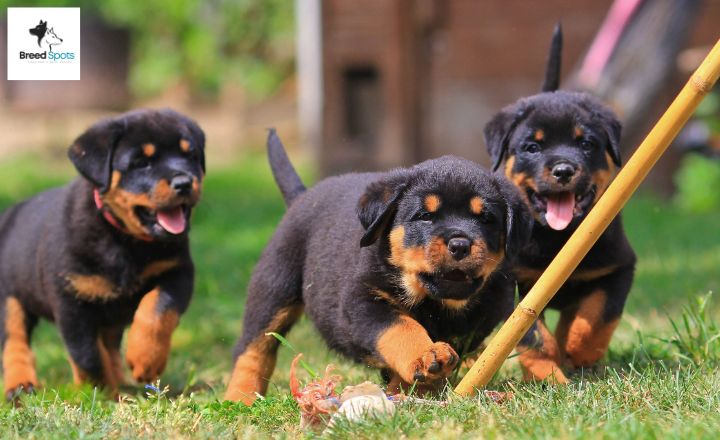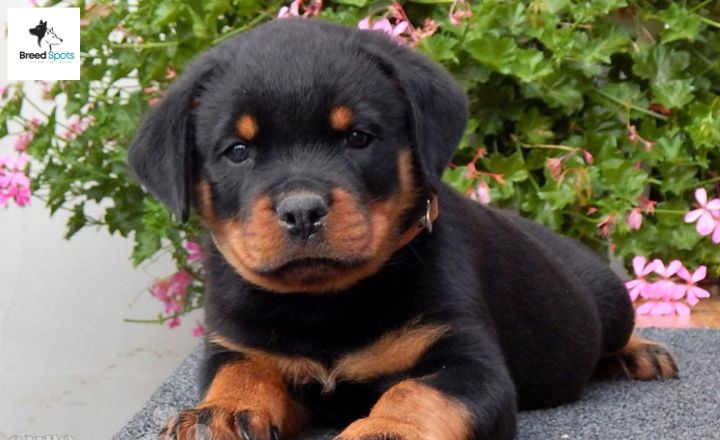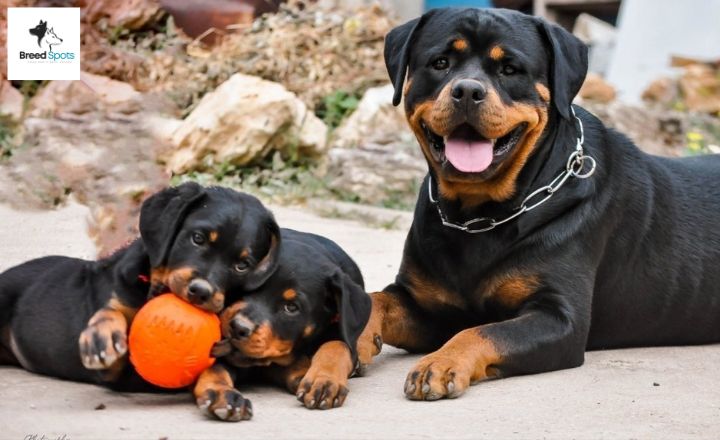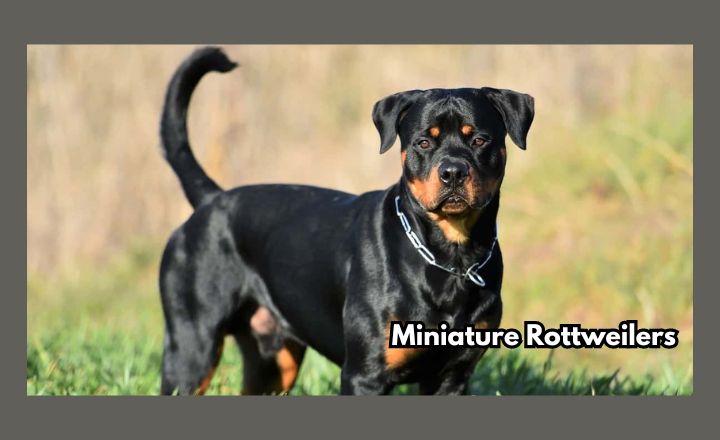Miniature Rottweilers are adorable little doggies whose pictures make us go “Awww”. But are they even a real breed or just Photoshop? Let’s find out everything.
Enter the intriguing phenomenon of miniature Rottweilers—a topic that has sparked curiosity and controversy among dog lovers everywhere.
Are these pint-sized pups a marvel of modern breeding or simply an illusion crafted by clever marketing? As we delve into this captivating subject, we’ll uncover the truth behind miniature Rottweilers.
While traditional Rottweilers are celebrated for their strength and loyalty, those claiming to have encountered a mini version often find themselves questioning what makes a breed distinct.
In this article, we’ll navigate through the murky waters of genetics and ethics in breeding practices, shedding light on whether miniature Rottweilers are indeed real dogs or just an endearing myth designed to charm puppy enthusiasts.
Is There A Miniature Rottweiler?

The concept of a miniature Rottweiler often sparks intrigue among dog enthusiasts, yet it must be clarified that there’s no officially recognized breed variation for small Rottweilers.
What many refer to as ‘miniature’ versions usually arise from breeding smaller individuals or mixed breeds, which can lead to a plethora of health issues and unpredictable temperaments.
Therefore, if you encounter a petite canine resembling a Rottweiler, it likely carries the traits of another breed or is simply an undersized genetic anomaly.
However, the allure of miniaturization in dog breeds isn’t just about aesthetics; it taps into deeper desires for companionship and convenience in modern living.
Are Pocket Rotties Real?
The concept of Pocket Rotties has generated both intrigue and skepticism among dog enthusiasts.
While the term typically refers to a smaller, more compact version of the Rottweiler breed, it raises questions about genetics, ethical breeding practices, and the definition of a healthy dog.
There’s no officially recognized standard for Pocket Rottweilers in canine registries, leading many to wonder whether this trend is merely a marketing gimmick fueling demand for something that may not exist within traditional breed specifications.
As miniaturization becomes increasingly popular in various dog breeds—from Chihuahuas to Dachshunds—the allure of owning a pint-sized Rottweiler can be tempting.
However, prospective owners must tread carefully. Ethical breeders prioritize health over size; modifying dogs’ stature often risks detrimental genetic outcomes that could affect their lifespan and well-being.
Thus, those enamored by the idea of Pocket Rotties should consider adopting from reputable sources that focus on maintaining the integrity and temperament characteristic of classic Rottweilers rather than succumbing to fads that prioritize appearance over quality.
Appearance

The Mini Rottweiler, often affectionately dubbed the mini rotty, possesses an undeniable charm that sets it apart from its larger counterparts.
With a sturdy frame that retains the muscular build characteristic of Rottweilers, these small wonders typically weigh between 30 to 50 pounds and stand about a foot tall at the shoulder.
Their striking appearance features a glossy black coat adorned with rich mahogany markings, giving them an air of nobility that is both approachable and commanding.
An interesting aspect of the Mini Rottweiler’s appearance is their expressive eyes — often deep brown and penetrating — which convey warmth and intelligence.
The blend of robustness and playfulness in their appearance invites potential dog owners to appreciate not just aesthetics but also personality, reminding us that size doesn’t dictate capability or loyalty.
Temperament

The temperament of a Mini Rottweiler is a fascinating reflection of its larger counterpart, albeit in a compact form.
Known for their loyalty and protective instincts, these spirited little dogs often possess the same unwavering devotion to family while showcasing an eagerness to please that can sometimes surprise owners unfamiliar with the breed.
Their playful nature combines endearing curiosity with bursts of energy, making them not only great companions but also entertaining playmates for children.
Socialization is crucial for fostering the right temperament in MiniRottweilers. Early exposure to various environments, people, and other animals encourages confidence over anxiety or shyness.
With consistent training infused with positive reinforcement, owners can nurture traits like obedience and adaptability, ensuring that this vibrant breed integrates seamlessly into diverse lifestyles—from bustling urban settings to serene suburban landscapes.
Are Mini Rottweilers Good Family Dogs?
Mini Rottweilers, often referred to as teacup or small Rottweilers, offer a unique blend of the breed’s signature traits in a more compact form.
While their smaller size may change perceptions about strength and intimidation, they retain the intelligence and loyalty that make Rottweilers beloved family companions.
These mini marvels are exuberant yet manageable for families with limited space, allowing them to thrive in apartments or smaller homes without sacrificing the essence of what makes a Rottweiler appealing.
Socialization remains crucial for Mini Rottweilers to develop their gentle side. Early exposure to various stimuli—people, pets, and environments—ensures these dogs grow up well-adjusted and comfortable in diverse situations.
Are Mini Rottweilers Good Guard Dogs?
Mini Rottweilers, despite their compact size, can embody many of the protective instincts and traits associated with their larger counterparts.
Their natural alertness makes them excellent watchdogs; they tend to be fiercely loyal to their families and are quick to assess unfamiliar situations.
This instinct allows them to alert owners of potential intruders without unnecessary barking, making them ideal for both urban apartments and suburban homes.
Moreover, mini Rottweilers possess a trainable nature that can be harnessed for effective guarding techniques.
With consistent training, they can learn commands and cues that enhance their protective abilities while maintaining a calm demeanor around friends or family members.
Are Mini Rottweilers Good With Other Pets?
Mini Rottweilers, often described as pint-sized powerhouses, can be surprisingly sociable when it comes to cohabiting with other pets.
Their temperament largely hinges on early socialization and training; if introduced to various animals during their formative months, mini Rotties can develop a friendly demeanor towards them.
This openness is not innate but rather nurtured through positive experiences and consistent reinforcement. Whether it’s the playful antics of a cat or the curious energy of a small dog, these miniature guardians can thrive in multi-pet households.
It’s crucial to remember that individual personality plays an important role as well. Some Mini Rottweilers might exhibit strong prey drives or territorial instincts over smaller creatures due to their protective nature.
Providing separate spaces for each pet offers them safe havens where they can retreat when feeling overwhelmed — this consideration fosters harmony in a bustling pet environment.
With patience and care, mini Rottweilers often emerge as affectionate companions that enrich diverse animal households beyond just their impressive loyalty levels.
Taking Care Of A Miniature Rottweiler

Owning a Miniature Rottweiler offers a unique experience, blending the bold character of the standard breed with a more manageable size.
These small but mighty pups require distinct care that goes beyond just providing food and shelter. One vital aspect to focus on is their exercise routine; despite their smaller stature, they are still energetic and thrive on daily activities.
Engaging them in interactive play can help channel their instincts, preventing boredom-related behaviors that could lead to unwanted mischief.
Exercise Requirements
Miniature Rottweilers, although smaller in stature than their standard counterparts, still possess a robust energy level and an innate drive that thrives on regular physical activity.
These dogs require a daily routine of exercise not just to stay physically fit but also to stimulate their minds and curb potential behavioral issues due to pent-up energy.
Engaging them in activities like agility training or more interactive sports can keep their enthusiasm alive while building strong bonds with their owners.
Training
Training Mini Rottweilers can be an incredibly rewarding experience, especially when you consider their unique blend of intelligence and affectionate nature.
Unlike larger Rottweilers, these smaller versions often have a more compact personality, making them great companions that fit well into family dynamics or apartment living.
One effective method for training is positive reinforcement—using treats, praise, and play to motivate your pup. This method not only reinforces desirable behaviors but also strengthens the bond between you and your dog.
Grooming

Grooming Rottweilers extends beyond mere aesthetics; it’s an important aspect of their overall health and well-being.
These robust dogs possess a short, dense double coat that requires minimal grooming compared to many other breeds, but regular brushing is essential to remove loose fur and skin debris while promoting a healthy shine.
Employing tools like slicker brushes or rubber curry combs can enhance circulation and spread natural oils throughout their coat, showing off the breed’s signature sheen.
Miniature Rottweiler Common Health Problems
Mini Rottweilers, while charming and affectionate companions, can be prone to a distinct set of health challenges. One of the most prevalent issues among these smaller versions of the breed is hip dysplasia.
This genetic condition can lead to debilitating arthritis later in life, making early detection and regular vet check-ups vital for maintaining an active lifestyle.
Owners are encouraged to engage their pets in low-impact exercises to keep their joints healthy while monitoring any signs of discomfort.
Another concern for mini Rottweilers is cardiac problems, particularly dilated cardiomyopathy (DCM).
This heart condition weakens the heart muscle, impairing its ability to pump blood efficiently. To protect your furry friend’s heart health, consider a high-quality diet combined with regular cardiovascular activities tailored to their size and energy level.
However, they still tend to be healthier than many other miniature breeds, such as Pocket Bullies or Teacup Chis.
Some of the health issues you might see in your Miniature Rottweilers include:
- Intervertebral Disk Disease (IVDD), is a common health problem in toy dog breeds that causes problems with the spine.
- Brachycephalic Airway Syndrome, which tends to affect flat-faced dogs. They are especially common if your pup is crossbred with some smaller Bulldog breed.
- Hypoglycemia, a drop in sugar levels in a dog’s blood, is also rather prominent in small breeds.
- Aortic Stenosis is a genetic condition that all Rottweilers are prone to.
- Progressive Retinal Atrophy (PRA), is a hereditary eye disease that is also common in Rottweilers, especially older dogs.
- Bone Cancer – Sadly, Rotties have a higher-than-average cancer risk for many types of tumors, especially bone cancer.
How Long Do Miniature Rottweilers Live?
Mini Rottweilers, often bred from standard Rottweilers and smaller breeds, have garnered a niche following due to their compact size and affectionate nature.
On average, these charming companions can expect to live between 10 to 15 years—a span that reflects not only their genetic makeup but also the care they receive throughout their lives.
Health considerations play a crucial role; like all breeds, Mini Rottweilers are prone to certain health issues including hip dysplasia and heart conditions.
Regular veterinary check-ups and proactive health management can significantly extend their longevity and improve their quality of life.
If your Rottweiler is mixed with some long-lived breed, such as French Bulldog, which is known to live around 12 years, you can expect your mixed breed pup to live longer than its purebred Rottweiler parent.
Should You Buy A Miniature Rottweiler?
After reading all this you have an idea about whether choosing to bring a mini Rottweiler into your home can be an intriguing decision, blending the beloved traits of the Rottie with a size that might better suit certain living situations.
These compact companions maintain the breed’s signature loyalty and protective instincts while catering to those who may have space constraints or prefer a smaller dog.
However, it’s vital to consider that they still require the same level of training, socialization, and mental stimulation as their larger counterparts. Neglecting this can lead to behavior issues masked by their adorable exterior.

